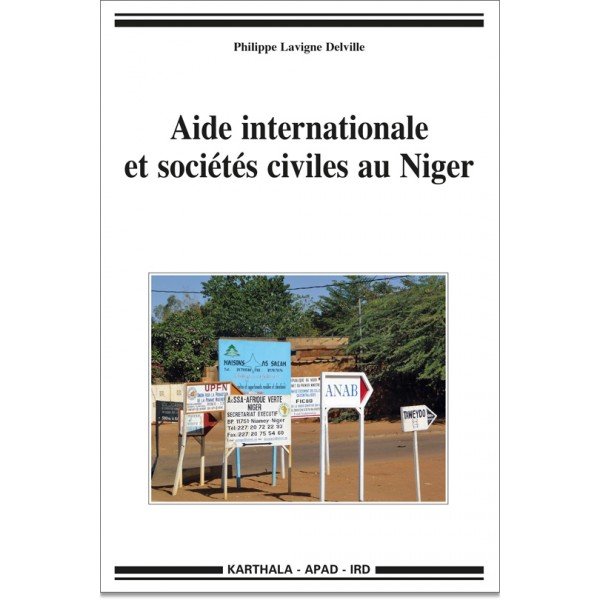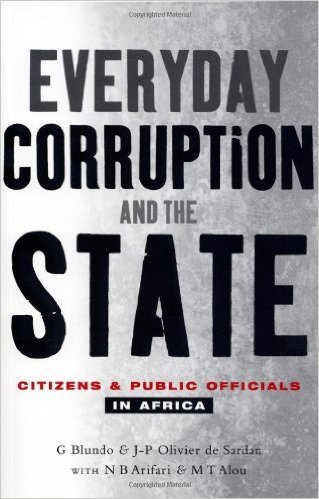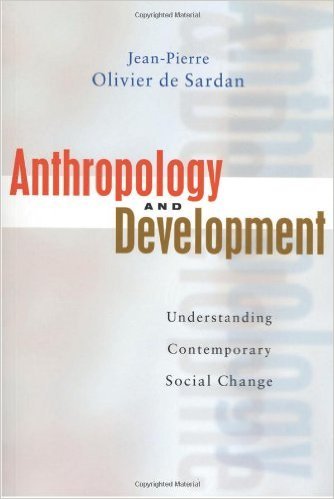
by Admin-Apad | 12 Nov 2015
Lavigne Delville P., 2015, Aide internationale et sociétés civiles au Niger, Paris/Montpellier/Marseille, Karthala/APAD/IRD.
Fruit d’une longue enquête, cet ouvrage propose une lecture originale des rapports entre aide internationale et sociétés civiles au Niger. Les premiers chapitres éclairent les dynamiques complexes et ambivalentes des organisations associatives au Niger, dans leur histoire, leurs rapports à l’État et à l’aide. L’auteur décrit les difficultés d’institutionnalisation des petites organisations, prises dans une double précarité des ressources financières et des ressources humaines, et soumises à des financements par mise en concurrence. A partir des débats sur un projet de « charte de la société civile », il montre les tensions qui traversent le secteur associatif, met en perspective les critiques récurrentes sur son opportunisme et sa politisation, explicite les enjeux de sa régulation.
Consacrés aux interventions en faveur des organisations de la société civile, les chapitres suivants interrogent la façon dont, suite aux Accords de Cotonou signés en 2000, la Délégation de l’Union européenne à Niamey a défini sa politique envers les « acteurs non étatiques » et comment elle l’a traduite sous forme de projet. Reconstituant l’histoire de la formulation de son « Projet d’appui à la société civile », entre 2002 et 2008, l’auteur décrit l’invention tâtonnante d’une politique, entre ambiguïtés de conceptions politiques et poids des dispositifs bureaucratiques.
Cet ouvrage représente un apport important, tant au débat sur la société civile en Afrique qu’à celui sur la façon dont les institutions d’aide définissent leurs politiques et leurs projets de développement. Il intéressera aussi bien les chercheurs en sciences sociales que les responsables associatifs et les praticiens du développement.
http://www.karthala.com/hommes-et-societes-sciences-economiques-et-politiques/3007-aide-internationale-et-societes-civiles-au-niger-9782811115036.html
Lire les notes de lecture de François Doligez dans la Revue internationale de l’économie sociale (RECMA revue Aide inter RECMA), de Sadio Soukouna dans la Revue internationale des études du développement (RIED, ex Revue Tiers Monde), de Véronique Dimier dans la Revue française de science politique (RFSP dimier review aide internationale) et de Tatiana Smirnova dans Afrique contemporaine (Sminorva sur aide int et societes civiles au NIger AFCO_265_0168-1).

by Admin-Apad | 11 Oct 2015
de Bruijn M. et Bouju J. ed., 2014, Ordinary Violence in Africa, Coll. Africa series, Leiden, Brill.
Ordinary social violence, – i.e. recurrent mental or physical aggression occurring between closely related people – structures social relationships in Africa, and in the world. Studies of violence in Africa often refer to ethnic wars and explicit conflicts and do not enter the hidden domain of violence that this book reveals through in-depth anthropological studies from different parts and contexts in Africa. Ordinary violence has its distinctive forms embedded in specific histories and cultures. It is gendered, implicates witchcraft accusations, varies in rural and urban contexts, relates to demographic and socio-economic changes of the past decades and is embedded in the everyday life of many African citizens. The experience of ordinary violence goes beyond the simple notion of victimhood; instead it structures social life and should therefore be a compelling part of the study of social change.

by Admin-Apad | 11 Oct 2015
Blundo G. and Olivier de Sardan J.-P. (with Bako-Arifari N. and Tidjani Alou M.), 2006, Everyday Corruption and The State. Citizens and Public Officials in Africa, London, Zed Books, 304 p.
Daily life in Africa is governed by the ‘petty’ corruption of public officials in services such as health, transport, or the judicial system. This remarkable study of everyday corruption in three African countries investigates the reasons for its extraordinary prevalence.
The authors construct an illuminating analytical framework around the various forms of corruption, the corruptive strategies public officials resort to, and how these forms and strategies have become embedded in daily administrative practices. They investigate the roots of the system in the growing inability of weakened states in Africa to either reward their employees adequately or to deliver expected services. They conclude that corruption in Africa today is qualitatively different from other parts of the world in its pervasiveness, its legitimations, and its huge impact on the nature of the state.
Lire la note de lecture dans le magazine Foreign Affairs.

by Admin-Apad | 11 Oct 2015
Olivier de Sardan J.P., Anthropology and development, understanding contemporary social change, London, Zed Books, 2005, 256 p.
This book re-establishes the relevance of mainstream anthropological (and sociological) approaches to development processes and simultaneously recognizes that contemporary development ought to be anthropology‘s principal area of study. Professor de Sardan argues for a socio-anthropology of change and development that is a deeply empirical, multidimensional, diachronic study of social groups and their interactions.
The Introduction provides a thought-provoking examination of the principal new approaches that have emerged in the discipline during the 1990s. Part I then makes clear the complexity of social change and development, and the ways in which socio-anthropology can measure up to the challenge of this complexity. Part II looks more closely at some of the leading variables involved in the development process, including relations of production; the logics of social action; the nature of knowledge; forms of mediation; and ‘political‘ strategies.
Following its successful publication in French, this important book will provoke much thoughtful debate within Anthropology, Sociology and Development Studies.

by Admin-Apad | 25 Jun 2015
Olivier de Sardan J.P., 2015, Epistemology, Fieldwork, and Anthropology, Palgrave Macmillan, 272 p.
Epistemology, Fieldwork, and Anthropology provides a systematic examination of the empirical foundations of interpretations and grounded theories in anthropology. Olivier de Sardan explores the nature of the links between observed reality and the data produced during fieldwork, and between the data gathered and final interpretative statements. Olivier de Sardan’s research asks how anthropologists develop a ‘policy of fieldwork’, what the advantages and limits of observation are, and if the dangers of over-interpretation and scientific ideologies be minimized. Exploring the space between epistemology and methodology, the book critically juxtaposes Anglo and Francophone writings about fieldwork, plausible interpretations, emicity, reflexivity, comparison, and scientific rigor.
(translation of “la rigueur du qualitatif”)
http://www.palgrave.com/page/detail/epistemology,-fieldwork,-and-anthropology-jeanpierre-olivier-de-sardan/?sf1=barcode&st1=9781137488497







Recent Comments